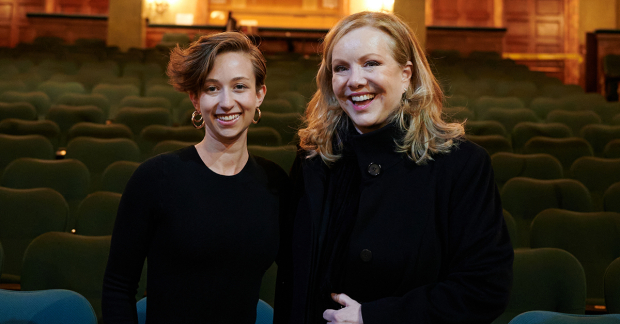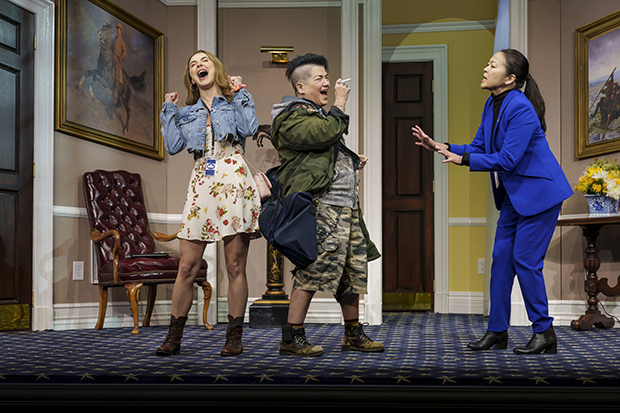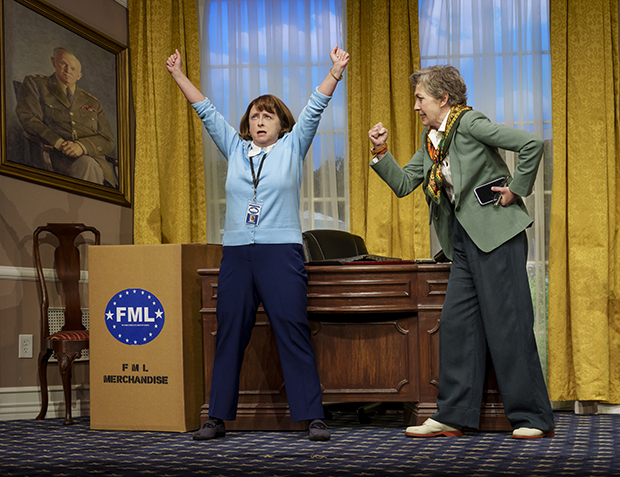Interview: Selina Fillinger and Susan Stroman Are Broadway's Not-So-Secret Comedy Weapon
Spoiler: There are Crocs involved.
The evening of November 8, 2016, was expected to go like this: Standing beneath a glass ceiling, Hillary Clinton would become the first-ever female president of the United States. We all know what happened next.
For many, it's difficult not to think about what could've been, but the impact of younger people's activism and political engagement reached a fever pitch. Some even resulted in runs for office, and some people like Selina Fillinger used it as inspiration for her play POTUS: Or, Behind Every Great Dumbass Are Seven Women Trying to Keep Him Alive. If there's any writer who understands complicated, multidimensional women, it's Fillinger.
She's responsible for writing nuanced characters for Reese Witherspoon and Jennifer Aniston in The Morning Show, now becoming one of the youngest women playwrights on Broadway. Leading her cabinet is multi-Tony-winning director Susan Stroman, who is spectacular in her own right after many a hilarious blockbuster musical and who is directing her first Broadway play.
Below, Fillinger and Stroman discuss mounting POTUS, the play's constant evolvement, their views on writing and politics, Broadway debuts, and being groundbreakers.

(© Jenny Anderson)
These conversations have been condensed and edited for clarity.
POTUS had a reading shortly before the March 2020 shutdown, so you had time to make adjustments. Did you try to stay in touch with your initial impulses of why you wrote the piece, Selina, or how you envisioned directing this piece, Susan, or did you gravitate more toward how you feel now and the changes in the world since that reading?
Selina Fillinger: Unfortunately, the initial impulses around this play have remained relevant and have remained the same. Patriarchy, white supremacy, and colonialism still infiltrate many of our systems. That was really where a lot of the anger and curiosity came from. That all remained the same, but we tried it out with different actors.
When you're building a play, you want it to be as bulletproof as possible, so it's really helpful to throw a lot of different voices at it and different bodies at it and see what sticks consistently because you want it to have as many iterations as possible.
I've been fortunate that all the actors I've ever worked with when workshopping this play have been extraordinary. But when you work with really extraordinary actors, sometimes they can sell things that aren't even the best thing. Sometimes you have to peep around that and be like, "Well, she's making that work, but it could be better textually. So that's a lot of what the process is. It's just, again, a lot of listening.
Susan Stroman: It all moved incredibly fast, and the theater folk got hit the worst about returning to work, and now that we've been able to go back, it's been crazy. For a play like this, the dialogue and the characters are so strong. That's how I began processing the story. The characters are so diverse and individual. Even though it is a comedy, they are based on reality.
When Selina wrote this play, when I was approached about directing it, I fell in love with it the minute I read it. My approach to it has changed slightly. I think Selina is an incredible craftsman who understands dialogue and character. Even though it's a comedy, she's making a statement about women and how some people abuse their power.

(© Paul Kolnik)
When you start working on a project, do you find your work textually first, or are you visual too? What was your first way of thinking about what POTUS could be?
Selina: The word that I would most describe is it's an aural experience. I'm listening for it more than trying to see it in text or see it like I'm onstage, which is the biggest difference between writing for the stage and writing for TV and film. When I write for the stage, I'm almost always trying to hear the play and the voices. And when I'm writing for TV and film, I'm trying to see it. I don't know if that's how my brain works or if other people feel that way.
I just started to imagine the ins and outs, like the day in and day out logistics of these women's lives, and just what would be the cost and challenge of every single task. You start small, and you start building. That's really where I started. You take as many combustive elements as possible and then put them in the current most like coordinate space and see what explodes first.
Susan: I did Colman Domingo's play Dot, off-Broadway, and there was comedy within those serious subjects. But when I got POTUS, I thought that because it was about women and their place in society and about what we read about now about the abuse of power, it seemed like the perfect time for it to come to Broadway. And so, in reading it I thought, "Oh, my hope is this really happens." There are a lot of times you'll gather a group of actors and read it around a table, and then it doesn't see the light of day. I'm very fortunate that my first play on Broadway is something as special as POTUS.
Have you had a moment in your career where either something changed your perception or affirmed it in regards to how you view your work?
Selina': In every single project I've worked on, I have learned something about myself as a person and an artist. Every single project I've chosen has been something new for me that I didn't know how to do when I set out to do it, or that had a particular challenge or something that scared me.
I think that happened unconsciously when I was first starting to write, and now it is something that I do consciously because I never went to grad school. I had an incredible undergrad education, but you want to keep growing. I've never been one of those people who want to find one thing and then do it for their careers. I'm just too curious for that, so I've always wanted to, with each project, grow and surprise myself and hopefully become a better writer.

(© Paul Kolnik)
Selina, what frightened you about writing POTUS?
Selina: It's so technically challenging just from a craft and technique point of view. It takes all of my mental and emotional capacity to keep you up. Not to mention this being my Broadway debut! I have seven trains running, and they all need to work together. And the pace. It's just not a very forgiving medium. You'll know if it doesn't work because no one will laugh.
What's a play in its most perfect version? Is it the play in performance? Is it the written version of the play? Or is it some version of what it could be?
Selina: You're asking me if you like your child as a baby or a teenager [laughs]!
Some aspects are magical about each [stage] of it when it's just me and the play, and I have all the control over exactly what's coming out. There is something so magical and intimate at that moment, and there's something precious about that. But plays aren't always meant to be read. They really aren't plays until people are embodying them and audiences are there. I feel like it has to be that sweet spot after audiences come when it's been running for a few weeks and the actors feel like it's just in their bodies in such a profound way, and everything just flies. I think that's when it is like peak play.
Susan: In the process of rehearsing these women, we read the text every day for a week, and before we mounted, we read each scene several times. But we also talked about how they fit themselves into this play, how this play has accessibility, and how they see themselves in these characters. I asked each woman to write an essay about where their character came from, how they related to the other characters, and their hopes at the end of this play. After they wrote those essays, we read them aloud, so everybody knew what the other actress was thinking and understood the relationship with one another. If something was different, we opened up for discussion. It was about allowing them to contribute to the play and the characterization of each other.








